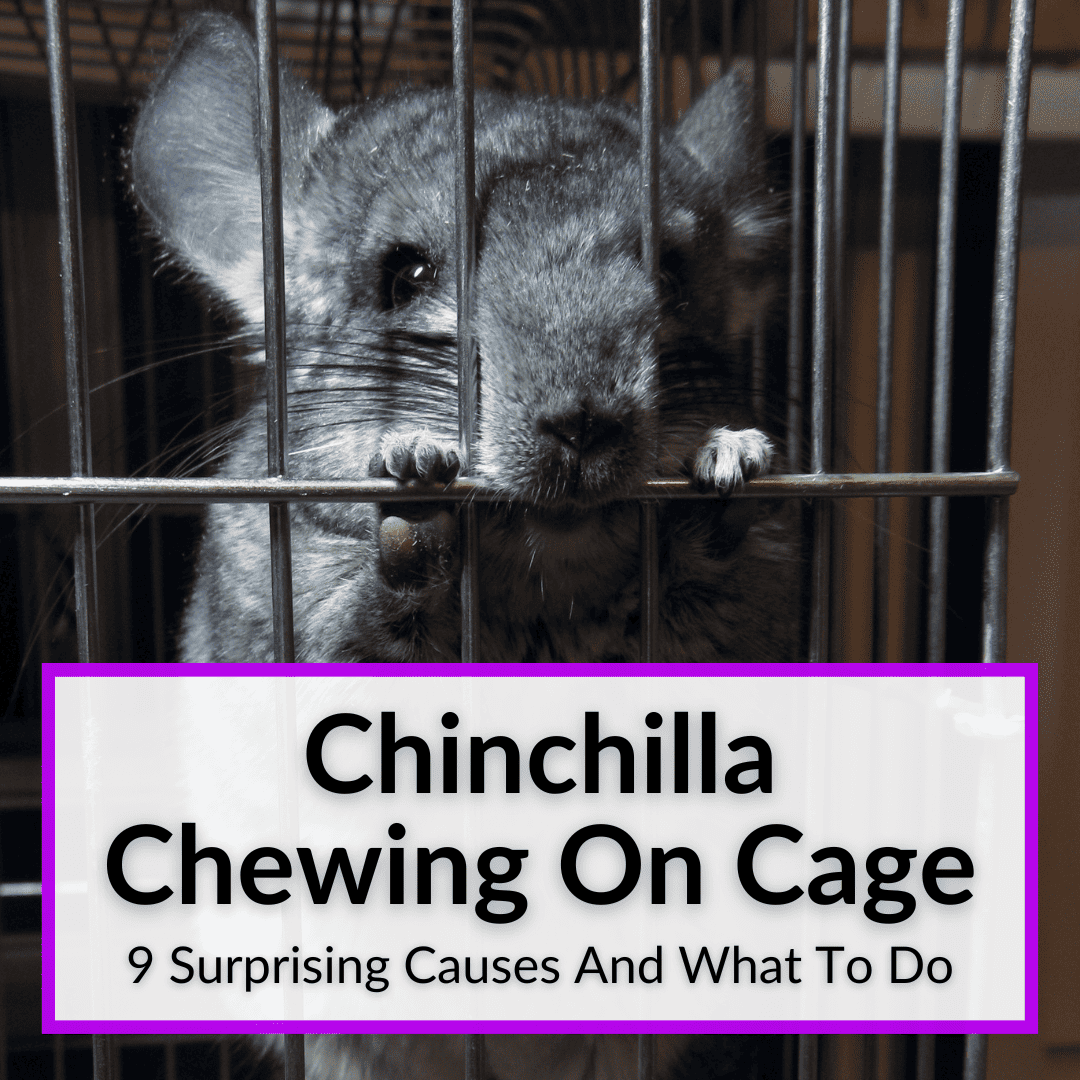
So why not chew on the cage?
A chinchilla chewing on its cage seems harmless, assuming the bars are metal.
But it’s not harmless.
Metal bars can damage your pet’s teeth and they may even have a toxic paint or other coating.
And if the bars are not metal, your pet may destroy them. Plastic bars can contain toxic elements as well.
All of this means that you will want to discourage your chinchilla from biting its cage. The first step to achieving that is to understand why your pet chews on its cage bars. There are actually a number of possible reasons.
Contents
Why Is My Chinchilla Biting Its Cage?
A chinchilla might bite its cage because chewing is an instinct in these animals. Chewing wears down their ever-growing teeth. If they do not chew, their teeth can grow right through the other side of their mouths!
Your chinchilla might also chew on its cage out of boredom, a lack of exercise, stress, anxiety, exploration, or to mark its territory. In rare cases, your pet may be looking to escape from its cage or might chew due to cage rage syndrome.
9 Reasons Chinchillas Chew On Their Cages
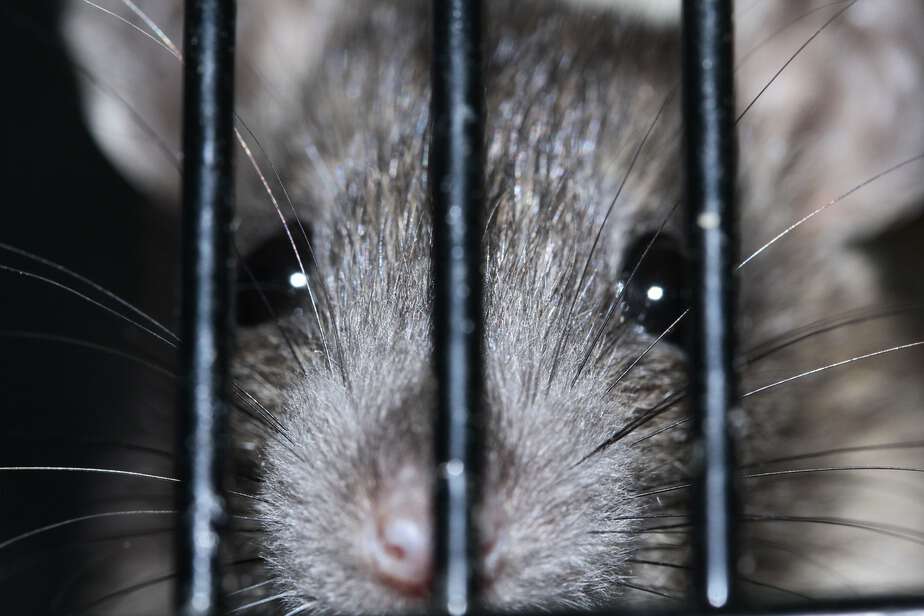
Chinchillas make excellent pets because of their adorable looks and cute antics. But they do tend to chew on everything. If you find your chinchilla chewing on its cage, it may be due to one, or more, of the following reasons.
To Satisfy Their Natural Chewing Instinct
In the wild, chinchillas chew on grass, twigs, and bark. Chewing not only breaks these substances down into easy-to-digest matter, but it also helps promote better nutrition absorption. As a result, your pet develops the habit of chewing constantly.
Chinchillas need to constantly chew on something to satisfy their instinct to gnaw. If you have not provided your pet with chew toys suitable for chinchillas, like wooden chewing objects, it may use its cage to chew.
To Explore And Play
Chinchillas often chew on objects as a way of exploring the world around them. Your pet may be trying to get an understanding of the cage’s texture and taste by chewing or licking it. This helps your chinchilla engage with its environment and learn more about its surroundings.
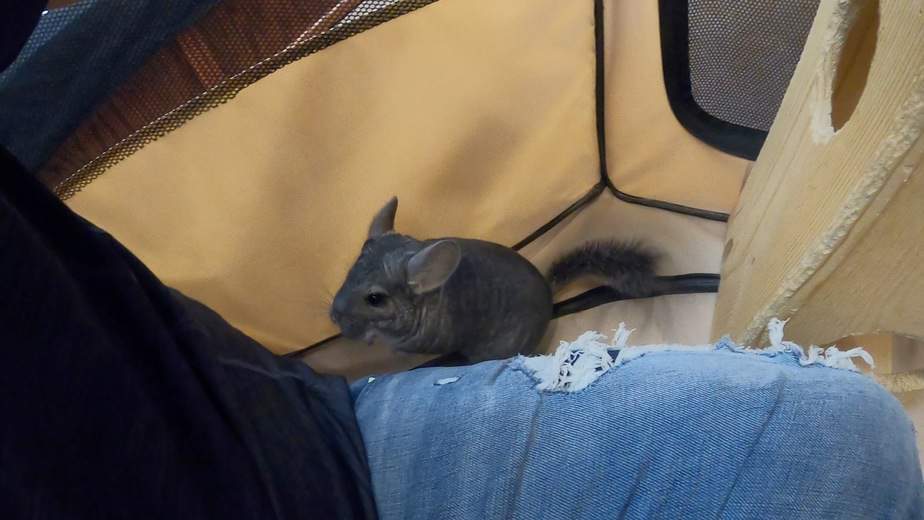
To Wear Down Their Ever-Growing Teeth
Another reason behind cage chewing in chinchillas is tooth maintenance. Chinchillas have ever-growing teeth, and chewing helps wear them down and keep them at a manageable length.
Failure to chew constantly can result in dental problems in chinchillas. Their sharp teeth may dig into their gums, resulting in a chinchilla abscess and other dental problems.
If they don’t have a constant supply of hay or grass, along with other safe chew toys and dental sticks, chinchillas may resort to chewing on their cage bars to keep their teeth in check.
Out Of Boredom
Chinchillas are smart animals, and they need plenty of mental stimulation. This mental stimulation could come in the form of interactions with their humans and other chinchillas, daily play-times in a safe enclosure, and plenty of toys, climbing areas, perches, running wheels, etc. in their cages.
Without mental stimulation, your chinchilla is bound to get bored. A bored chinchilla will resort to cage chewing.
Due To Insufficient Physical Activity Or Exercise
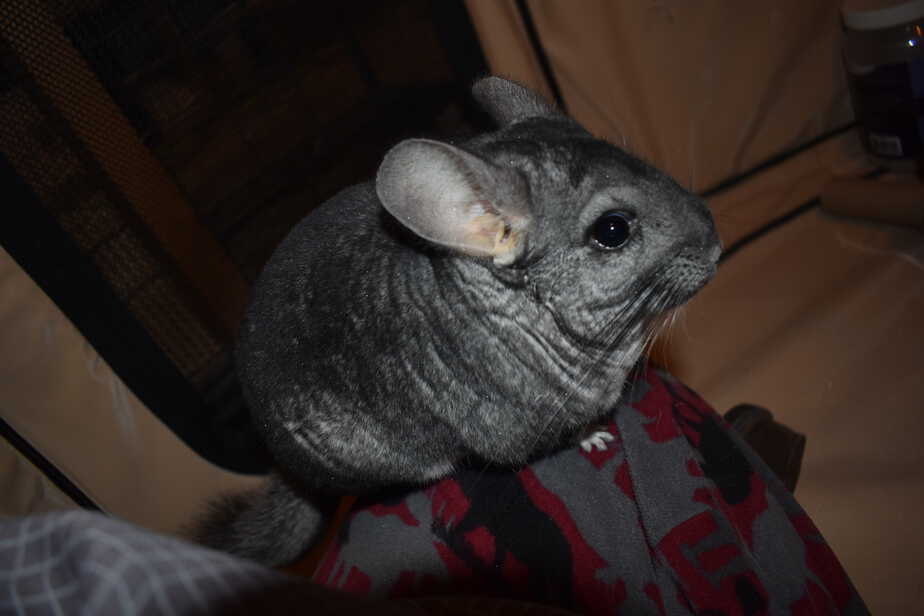
Imagine being kept indoors all day without any physical activity! Like humans, chinchillas need a lot of physical activity to expend their pent-up energy.
If you do not provide your chinchilla with enough opportunities to run, play, and climb as they do in the wild, it may turn to destructive chewing to release that energy.
Due To Stress Or Anxiety
Chinchillas can also get stressed or anxious for various reasons. Factors like excess handling, loud noises, moving the cage to an unfavorable location, traveling with your chinchilla, an improper environment, extreme weather conditions, the presence of another (bully) chinchilla, etc. could cause stress in your pet.
Most chinchillas fur slip when stressed, but some may also chew on their cages to deal with their anxiety.
To Mark Their Territory
Chinchillas may even be trying to leave their scent on the cage bars by chewing or licking them. This may be your pet’s way of showing other animals that the cage is its territory and that no one should enter. For the same reason, you might find your cute little pet holding and dropping things!
To Escape

In rare cases, an unhappy chinchilla might try to chew its way out of the cage. Perhaps, your chinchilla thinks its cage is too small or dirty. It may feel claustrophobic in the small cage. Your pet might even attempt to escape if it is bored, lonely, or sexually frustrated.
Due To Cage Rage
In rare cases, your chinchilla may show cage rage, where it might aggressively chew on its cage wires. “Cage rage,” or “cage syndrome,” is a form of aggressive chewing often seen in small pets kept in cages.
Other signs of cage rage include changes in appetite and sleep patterns and aggressive behavior towards toys and other chinchillas.
Are chinchillas aggressive as a species? No, aggression is rare. Cage rage usually stems from inadequate mental and physical stimulation as well as unhygienic, or otherwise inadequate, conditions.
How To Stop Chinchillas From Chewing Cage
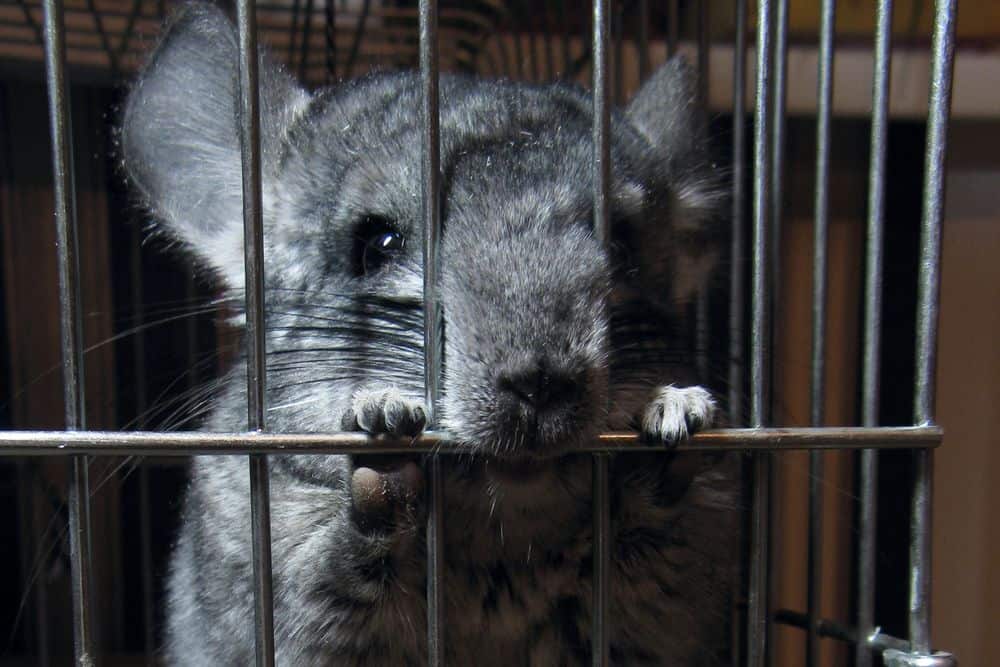
Here are some things you can do to prevent your chinchilla from chewing the cage bars.
- Make sure the cage is of optimum size: A chinchilla’s cage should be at least 4 x 4 x 3 feet for a single chinchilla. This is necessary to prevent cage rage. If you have several chinchillas, make sure to provide a larger cage with multiple levels.
- Clean the cage regularly: No one likes living in unhygienic conditions, and that includes your chinchilla. Make sure to deep clean your pet’s cage monthly and spot-clean it two or three times a week.
- Provide plenty of safe chew toys and enrichment toys: Apple bark or other untreated wooden toys, rope toys, dental chews, chinchilla pumice stone, etc. are excellent outlets to prevent chinchilla cage chewing. You can also provide puzzle feeders, add obstacle courses, and hide treats to stimulate your chinchilla mentally.
- Rotate the toys regularly: Chinchillas can get bored with the same toys. Add new ones or hide and reintroduce toys from time to time.
- Add an exercise wheel: A tired chinchilla is less likely to chew on its cage bars. A safe, appropriately sized running wheel can help your chinchilla expend its extra energy.
- Allow your pet an hour outside its cage per day: Provide your chinchilla with a playpen or safe enclosure to run around in, but do make sure it is escape-proof.
- Interact with your chinchilla: Social interaction is important for these intelligent animals. Try to handle your pet gently by offering it treats. You could also train your chinchilla to perform tricks like turning in a circle, playing dead, grabbing an object, etc.
- Minimize stress for your pet: Make sure your chinchilla’s cage is located away from loud noises and other stressful conditions. Ensure there are adequate hiding areas and a soft bed for it to sleep on. The cage should not be located in direct sunlight or near AC or heating ducts. Add hideouts, nesting boxes, perches, and ladders to the cage, so your pet can mimic climbing, running, digging, etc. the way it does in the wild.
- Rule out health issues: If, despite providing different toys, your chinchilla continues cage-biting, then please see a vet to rule out dental or other health issues. An exotic vet or animal behaviorist can also guide you in this matter.
Can Chinchillas Chew on Metal?
No. You should not allow your chinchilla to chew on metal objects like cages. There are several reasons this can be bad, so follow our tips above to keep your pet from chewing its cage, if you see it begin to develop this habit. This is why you should not let your pet chew its metal cage bars:
The Metal Could Be Toxic
The cage bars could have toxic paint on them. Chewing on the bars could cause your tiny pet to ingest this toxic paint, albeit in small quantities. For a small chinchilla, even a tiny amount of toxic paint can be dangerous and could result in diarrhea and/or abdominal pain. Can chinchillas vomit the paint back up? No, they can’t vomit and have no gag reflex.
It Could Harm Their Teeth
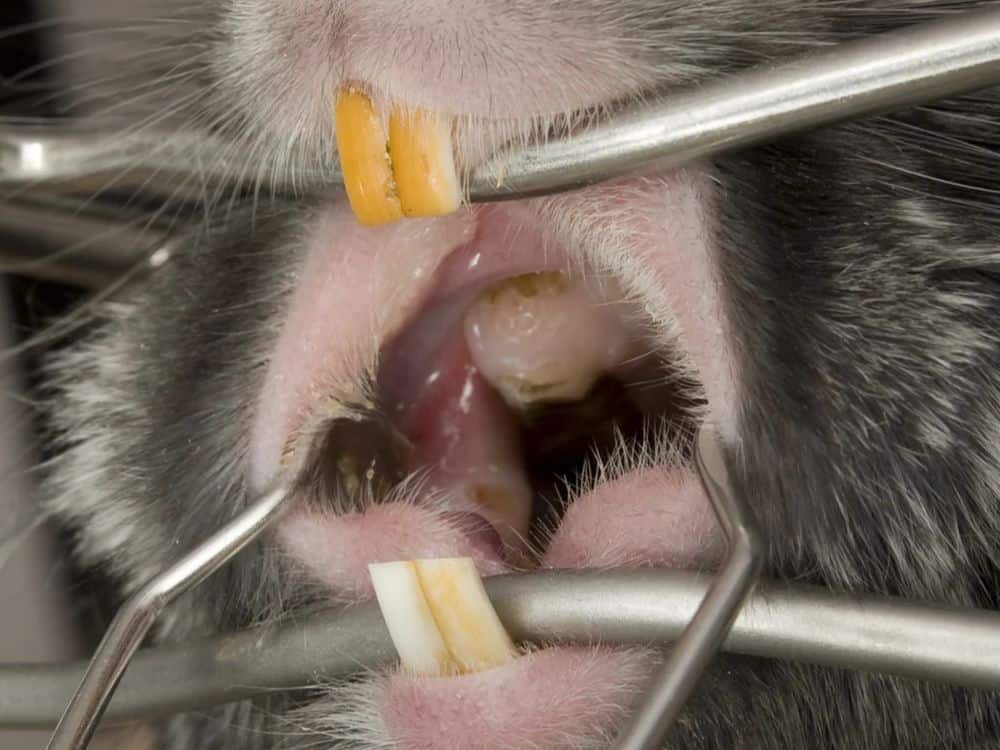
Sharp metal objects, like metal toys or cage bars, could also hurt your chinchilla’s teeth. Chewing on such objects may cause their teeth to chip or break. The sharp metal could even hurt the animal’s delicate gums.
Worse, constant cage chewing might push your chinchilla’s teeth out of alignment, resulting in permanent damage.
How Often Should I Let My Chinchilla Outside its Cage?
Most chinchillas love to play and will welcome scheduled playtime of 1 to 3 hours out of their cages daily. However, the timing and duration for which you let your chinchilla out of its cage will depend on your pet’s personality and comfort levels.
You can start with small sessions of 10 to 15 minutes and gradually increase them to an hour or two a day. Make sure the enclosure is secure and escape-proof. If you find your chinchilla getting anxious or stressed in its playpen, please allow it to go back inside its cage.
Chinchilla Chewing On Cage: Final Thoughts
A chinchilla chewing on its cage is not a god thing. You want to encourage your pet to chew on safer things. The first step is to understand why your chinchilla is biting its cage bars.
Once you know the reason for the behavior, you can address it. Usually this means remedying whatever is bothering your pet, or providing it alternatives to achieving its goals, which are usually to grind down its teeth. Most of the time, you can fix this issue by providing your pet some safe chew toys to chew on instead.
Leave a Reply